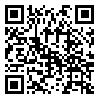BibTeX | RIS | EndNote | Medlars | ProCite | Reference Manager | RefWorks
Send citation to:
URL: http://hnmj.gums.ac.ir/article-1-202-en.html

 , Mehdi Bakaian
, Mehdi Bakaian 
 , Tahereh Khaleghdoost
, Tahereh Khaleghdoost 
 , HamidReza Behnam Veshani
, HamidReza Behnam Veshani 
 , Atefeh Ghanbari Khanghah
, Atefeh Ghanbari Khanghah 
 , Rabiollah Farmanbar
, Rabiollah Farmanbar 

Knowledge and attitude of the families with a mental patient about the electroconvulsive therapy at the Ebn-e- Sina psychiatric center of Mashad
By:Bakaian.M.MSN, Yazdandoost.Z.MSN, Khaleghdoost.T.MSN, Behnam.V.H.MSN, Ghanbari. A. PhD, Farmanbar. R. MSN
Abstract:
Introduction: Electroconvulsive therapy is the most common and also unique method in psychiatry that is used for treatment of many mental disorders such as major depression, schizophrenia and etc. Despite of safety and usefulness of this method, the patients and families have a great deal of stress about it. This stressful approach caused negative attitudes and difficulties in treatment and following up care .Since reactions of the patients and their families can be effective for reforming the medical programs, so considering their knowledge, opinion, experiences and attitudes about ECT is very important.
Objective: The goal was to determine the knowledge and attitude of the mental patients, families about the electroconvulsive therapy at the Ebn-e- Sina psychiatry center of Mashad
Methods: This research is a descriptive study and its samples consist of 71member of the families whose patients previously experienced ECT at least once. The means for collecting data was a questionnaire, which was filled by the researcher through structured interviewing in three sections including demographic data, knowledge questions and attitudes questions. For data analysis, descriptive statistics (mean, standard deviation) and inferential statistic(x2, spearman correlation coefficient) were used.
Result: Findings totally showed that most of members (71/8%) had a poor knowledge and 70/4% of them had a negative attitude about ECT. The result also indicated a significant statistical relation between knowledge about ECT with level of education (P<0/0001), hospitalization (p<0/034) and times of getting (p<0/016). Furthermore the attitudes toward ECT had a significant statistical relation with hospitalization (p<0/002) and times of getting (p<0/001). The obtained results showed no significant statistical relation between knowledge about ECT and attitudes toward ECT with other demographic variables. Spearman correlation coefficient test obtained a right correlation and a significant statistical relation between knowledge about ECT and attitudes toward it (p<0/001, r=0/78).
Conclusion: These findings indicated that the participants have a low level knowledge and a negative attitude about ECT. Furthermore, there was more knowledge if the level of education had been Higher, and the member of families whose patient had been hospitalized more and more received more ECT, had a higher knowledge and positive attitude about ECT.
Key words: knowledge, attitude, family, mental disorder, electroconvulsive therapy
Received: 2014/08/9 | Accepted: 2014/08/9 | Published: 2014/08/9
| Rights and permissions | |
 | This work is licensed under a Creative Commons Attribution-NonCommercial 4.0 International License. |

